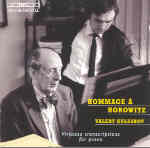Vladimir Horowitz concocted some of piano music’s most dazzling and effective virtuoso transcriptions, yet avoided notating them for the same reason a great master chef refuses to divulge the ingredients of a succulent recipe. That hasn’t stopped intrepid pianists from laboriously and painstakingly transcribing them off of Horowitz’s recordings, including Valery Kuleshov. None other than Horowitz himself vouched for Kuleshov’s accurate decodings, and, more importantly, praised the young pianist’s performances.
In his booklet notes, Kuleshov stresses his aim to make these showpieces his own, rather than slavishly copy the master. Certainly Kuleshov shapes the opening section of Liszt’s Hungarian Rhapsody No. 19 with greater deliberation and weightier chord playing than Horowitz’s leaner, more angular rhetoric. He also allows Vallée d’Obermann’s brooding narrative to unfold in stricter tempo, although he doesn’t quite match the feverish drive of Horowitz’s octave technique (but who does?). And Horowitz’s youthful original pieces are played with insouciant character and charm.
Kuleshov’s technique easily accommodates the pianistic acrobatics sprinkled throughout the Carmen, Wedding March, and Danse Macabre transcriptions, but the musical results lack the textural variety, canny accentuations, rhythmic verve, and dynamic gradations that make Horowitz unique. Even Arcadi Volodos’ version of Carmen is suppler and more individually voiced. Hear, for example, how in The Stars and Stripes Forever Horowitz will slightly rush certain octave passages to goose up the dramatic stakes, while Kuleshov’s straighter, more foursquare pianism just misses that edge-of-seat excitement in the final refrain. Most pianists, however, would give their eyeteeth to sail through these transcriptions with Kuleshov’s polish and command, and my quibbles take nothing away from his impressive achievement. But remember: no one plays Horowitz like Horowitz.
































